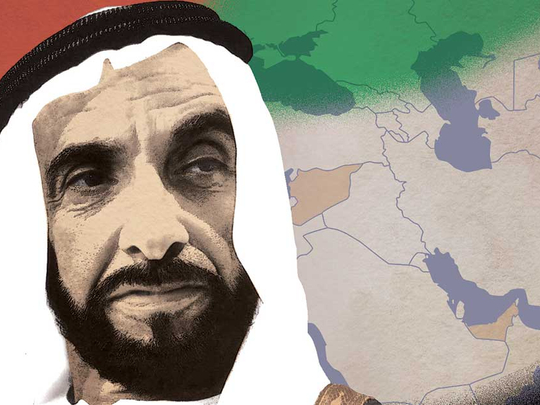
In March 1972, schoolchildren were given a day-off throughout Syria.
They were asked to come out in large numbers, welcoming late Shaikh Zayed on his first official visit to Damascus.
This was just less than four months after he had wrapped up negotiations with the other six rulers of the Trucial States, becoming president of the UAE.
Syria had been among the first countries in the world to recognise the UAE’s formation on December 2, 1971.
Large UAE flags were hoisted along all major thoroughfares throughout Damascus, while tailors at the old Hamidieh Market spent the week hand-making hundreds of small flags, which were distributed to students.
Damascus had sincere admiration for the UAE founder, who was described by contemporaries as a fearless, wise and selfless Arab patriot.
He was decorated with the Umayyad Order of Merit, the highest honour of the Syrian Republic, that had been bestowed upon historic figures such as Jawaharlal Nehru, the first prime minister of India; Charles de Gaulle, former president of France; and Jamal Abdul Nasser, former president of Egypt.
One year later, a new curriculum was adopted throughout Syria, and Grade 12 history books were revised to include a special section on late Shaikh Zayed. Positioning itself as the “beating heart of Arab nationalism”, Syria went to great lengths in highlighting late Shaikh Zayed’s illustrious career.
During his father’s brief tenure as ruler of Abu Dhabi, from 1922-1926, late Shaikh Sultan Bin Zayed Bin Khalifa Al Thani had supported a national uprising against French rule in Syria, sending money to Syrian rebels.
He reportedly had a soft spot for Damascus, the former capital of the Umayyad Dynasty. This is where Islam had its first empire, with a proper bureaucracy, internal security, a navy and a postal service.
It is from there that Islam expanded to reach territories as far away as China and Spain. During his 1972 visit, late Shaikh Zayed met university professors and high school history teachers, stressing his personal admiration for the history of Damascus.
According to the then defence minister, Mustapha Tlass, who was present at the meeting, late Shaikh Zayed said: “There is an inseparable bond between Syria and me.
I was born in 1918, the day Syria got its independence from the Ottomans. I became governor (of the Eastern Region of Abu Dhabi) in 1946, the year Syria got its independence from France.
We both are working for unity of the Arabs and their emancipation from foreign tutelage.”
A few years later, a former Syrian economist named Izzat Al Tarabulsi landed in Abu Dhabi, tasked by late Shaikh Zayed to establish the Central Bank of the UAE. Educated at the Sorbonne University in Paris, he had briefly served as minister of economy in Syria in 1962-1963.
Late Shaikh Zayed continued to visit Damascus regularly for the next 20 years, with a memorable final visit in August 1995. Every single time, the streets would get clogged with massive outpouring of humanity.
Time and again, Damascenes showed their respect for the “wise man” of the Arabs, as he was popularly called.
When he died, in 2004, Damascus declared three days of national mourning — very different from the routine procedure taken by governments when an Arab head-of-state passes away.
On that evening, on November 2, 2005, the streets in Damascus were empty, as if a general curfew had been imposed on the city.
Only, there was no curfew — but people stayed at home, watching the news and documentaries pouring out on Arabic television networks. They were truly saddened by the passing away of such a fine patriot.
Two years later, a poll was carried out at private Syrian universities, asking about “heroes” in the Muslim world. More than 600 students were asked to choose their favourite non-Syrian hero, from a long list that included ancient characters like Salah Al Deen and contemporary ones like Nasser, Palestine Liberation Organisation leader Yasser Arafat and former Iraqi president Saddam Hussain.
Late Shaikh Zayed came in first, with 54 per cent of the respondents choosing him as the top Arab hero. Mahathir Mohammad, former prime minister of Malaysia, came in second, with 36 per cent.
Poll administrators were surprised, expecting the lion’s share of votes to go to revolutionary figures like Nasser and Arafat, or to someone like Hassan Nasrallah of Hezbollah, who had just emerged unscathed from a 34-day war with Israel.
When asked to justify their choice, the young Syrians said they admired late Shaikh Zayed because he had created a country from a scratch, built a vibrant economy, provided jobs to thousands of Arabs, and remained committed to Islam and Arab nationalism.
He had clearly impressed them far more than revolutionary socialists who had promised to annihilate the state of Israel, yet failed to achieve their goal. Damascus at the time was recovering from years of economic and political turmoil, triggered by the American occupation of Baghdad and the murder of former Lebanese prime minister Rafik Hariri murder in Lebanon.
Pain and anguish were fresh on everybody’s mind. Familiar faces throughout the Arab world had been replaced with inexperienced newcomers.
In such a rapidly changing world, late Shaikh Zayed was the only constant in Arab politics — a face that people trusted and whom they had known for a very long time.
Sami Moubayed is a Syrian historian and former Carnegie scholar. He is also the author of Under the Black Flag: At the frontier of the New Jihad.












